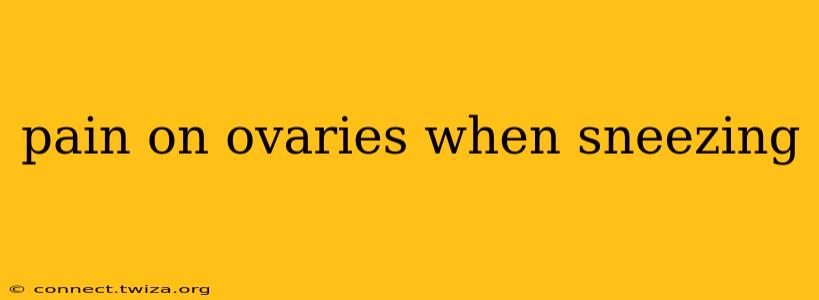Experiencing pain in your ovaries when you sneeze might seem alarming, but it's often linked to relatively benign causes. However, it's crucial to understand the potential reasons behind this discomfort to ensure you seek appropriate medical attention if necessary. This comprehensive guide explores the possible explanations for ovarian pain triggered by sneezing, helping you understand when it's something to worry about and when it's likely a minor issue.
What Causes Ovarian Pain During Sneezing?
The primary reason for ovarian pain during sneezing is the sudden increase in abdominal pressure. Sneezing is a forceful expulsion of air from your lungs, creating significant pressure changes within your abdomen. This pressure can irritate or put stress on sensitive structures in your pelvic region, including your ovaries, fallopian tubes, and ligaments.
Several factors can increase your susceptibility to this type of pain:
- Ovarian cysts: These fluid-filled sacs on the ovaries can become painful when pressure changes occur, as is the case during sneezing. Larger cysts are more likely to cause discomfort.
- Endometriosis: This condition involves the growth of uterine tissue outside the uterus. The inflammation and irritation associated with endometriosis can be exacerbated by increased abdominal pressure from sneezing.
- Pelvic inflammatory disease (PID): PID is an infection of the female reproductive organs. The inflammation and tenderness caused by PID can make sneezing particularly painful.
- Ovulation pain (mittelschmerz): Some women experience pain during ovulation, and the added pressure from sneezing could intensify this pre-existing discomfort.
- Ectopic pregnancy: While less common, an ectopic pregnancy (a pregnancy outside the uterus) can cause significant abdominal pain that might be aggravated by sneezing. This is a serious condition requiring immediate medical attention.
- Other underlying conditions: Less common causes might include ovarian torsion (twisting of the ovary), or other inflammatory conditions in the pelvis.
Is Ovarian Pain When Sneezing Serious?
The seriousness of ovarian pain during sneezing depends heavily on the underlying cause and the intensity of the pain. While many cases are relatively harmless and linked to minor irritations, some situations require immediate medical evaluation.
When to Seek Medical Attention:
- Severe or sudden onset of pain: If the pain is intense, sharp, or comes on suddenly, seek immediate medical attention.
- Pain accompanied by other symptoms: Fever, vaginal bleeding, dizziness, faintness, or severe abdominal cramping warrant immediate medical evaluation.
- Recurring or persistent pain: If the pain is recurring or doesn't resolve on its own, consult your doctor.
- Suspected ectopic pregnancy: If you're pregnant and experiencing ovarian pain, particularly if accompanied by other symptoms like vaginal bleeding, seek immediate medical help.
How Can I Relieve Ovarian Pain When Sneezing?
For mild ovarian pain triggered by sneezing, these measures might offer relief:
- Gentle heat: Applying a warm compress or heating pad to your lower abdomen can help soothe discomfort.
- Over-the-counter pain relievers: Ibuprofen or acetaminophen may help manage mild pain.
- Rest: Allowing your body to rest can reduce strain and promote healing.
- Gentle stretching: Light stretching can help ease tension in your abdominal muscles. However, avoid any strenuous activity.
It's essential to remember that self-treating is not a substitute for professional medical advice. If you experience persistent or severe pain, consult a healthcare professional for proper diagnosis and treatment.
Can certain medications cause ovarian pain?
Some medications, while not directly causing pain during sneezing, can exacerbate underlying conditions contributing to ovarian discomfort. Hormonal medications, for example, can influence the menstrual cycle and increase the risk of cyst formation. Always inform your doctor about all medications you are taking.
When should I go to the emergency room for ovarian pain?
Seek immediate emergency care if you experience severe, sudden ovarian pain, especially if accompanied by fever, dizziness, or vaginal bleeding. These symptoms could indicate a serious underlying condition requiring urgent medical intervention.
What are the long-term effects of ignoring ovarian pain?
Ignoring persistent or recurring ovarian pain can lead to several complications depending on the underlying cause. Conditions like endometriosis, PID, or ovarian cysts can worsen without treatment, potentially leading to infertility, chronic pain, or other serious health problems.
This information is for general knowledge and does not constitute medical advice. Always consult a healthcare professional for any health concerns.
